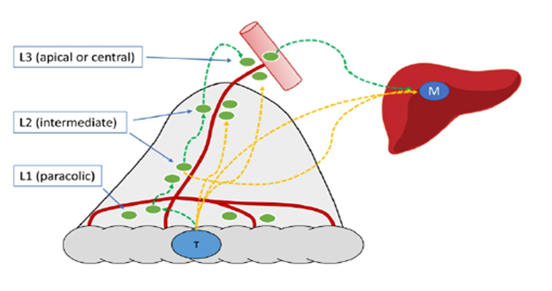Identification of lymph node metastasis progression patterns in colorectal cancer using OSNA method
Information updated: July 31, 2023
- Seeds Information
- Researcher Information
- What do you expect from collaboration with companies?
- Contact for this research
Seeds Information
keyword
OSNA
Field
Colorectal cancer
Overview
There are two possible modes of lymph node metastasis in colorectal cancer: the cancer progresses from the primary tumor in order (sequential model), or it skips and causes distant metastasis (skip model). However, lymph node metastasis is usually diagnosed only by HE staining including the maximum cut surface of the lymph node, and micro-lymph node metastasis is not evaluated, so the true mode of lymph node progression is still unclear.
In this study, we used the One-step Nucleic Acid Amplification (OSNA) method to detect micrometastasis by RT-PCR of CK19 mRNA to identify cases of micrometastasis in stage III colon cancer that are pathologically positive for lymph node metastasis, and to clarify the true form of lymph node spread.
If it becomes clear that the true mode of lymphatic progression roughly follows a sequential model, it can be predicted that the prognosis will become worse as lymph node metastasis progresses toward the central region. If this trend is demonstrated in this study, it will provide rationale for the development of new treatments in which extended lymph node dissection with a sufficient range of resection contributes to improving prognosis.
What's new?
The true mode of lymph node metastasis in colorectal cancer remains unclear. This study aims to clarify the true mode of lymph node metastasis using the OSNA method.
What are its advantages over other studies?
The diagnosis of lymph node metastasis is usually made only by HE staining including the maximum cut surface of the lymph node, and micro lymph node metastasis is not evaluated.
This study aims to clarify the true pattern of lymph node progression by classifying lymph nodes according to the site of lymph node metastasis and analyzing the distribution of lymph node metastasis.
What problem does it help solve?
If the true type of lymphatic spread is clarified, it will become rationale for the development of new treatments that will contribute to improving prognosis by providing extensive lymph node dissection with a sufficient extent of resection.
Possibility of other applications and developments
―
Related Patents
―
Related papers
- Kataoka K, Beppu N, Shiozawa M et al. Colorectal cancer treated by resection and extended lymphadenectomy: patterns of spread in left- and right-sided tumors. Br J Surg . 2020;107(8):1070-1078.
- Kataoka K, Ysebaeart H, Shiozawa M, et al. Prognostic significance of number versus location of positive mesenteric nodes in stage iii colon cancer. Eur J Surg Oncol. 2019; 45; 1862-1869
- Yamamoto H, Tomita N, Inomata M, Furuhata T, Miyake Y, Noura S, et al. OSNA-Assisted Molecular Staging in Colorectal Cancer: A Prospective Multicenter Trial in Japan. Annals of surgical oncology. 2016;23(2):391-6.
Researcher Information
| full name | Kozo Kataoka |
|---|---|
| Affiliation | Department of Gastroenterological Surgery, Faculty School of Medicine |
| Specialization | Colorectal cancer |
| Collaborative Researcher | Masaki Ohtani |
| Related links | KAKEN DB |
What do you expect from collaboration with companies?
Joint research on the development of more accurate diagnostic methods for lymph node metastasis, such as ctDNA
Contact for this research
兵庫医科大学 大学事務部 研究推進課
E-mail: chizai@hyo-med.ac.jp
Tel: 0798-45-6488

 Research Seeds Collection
Research Seeds Collection

